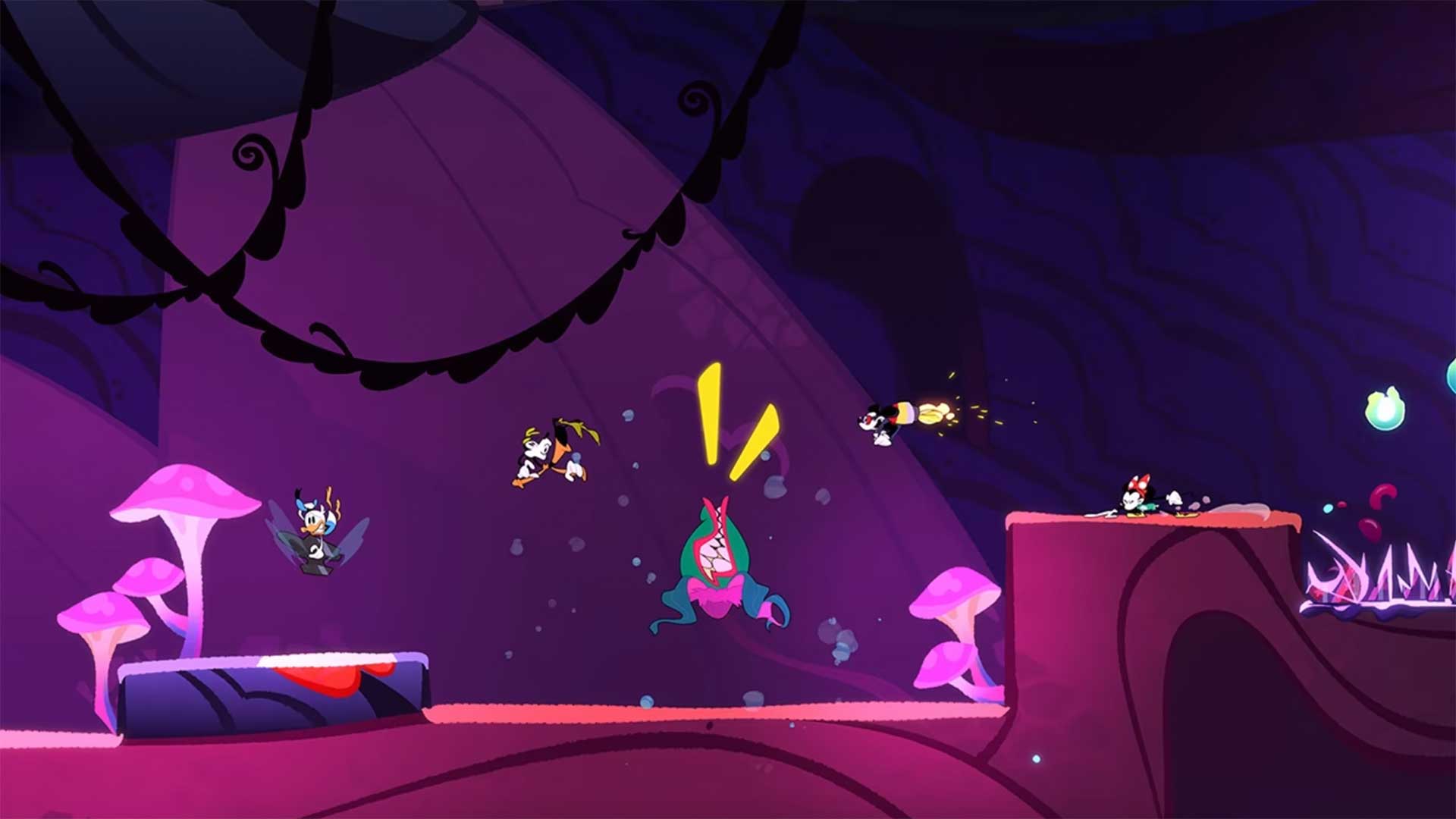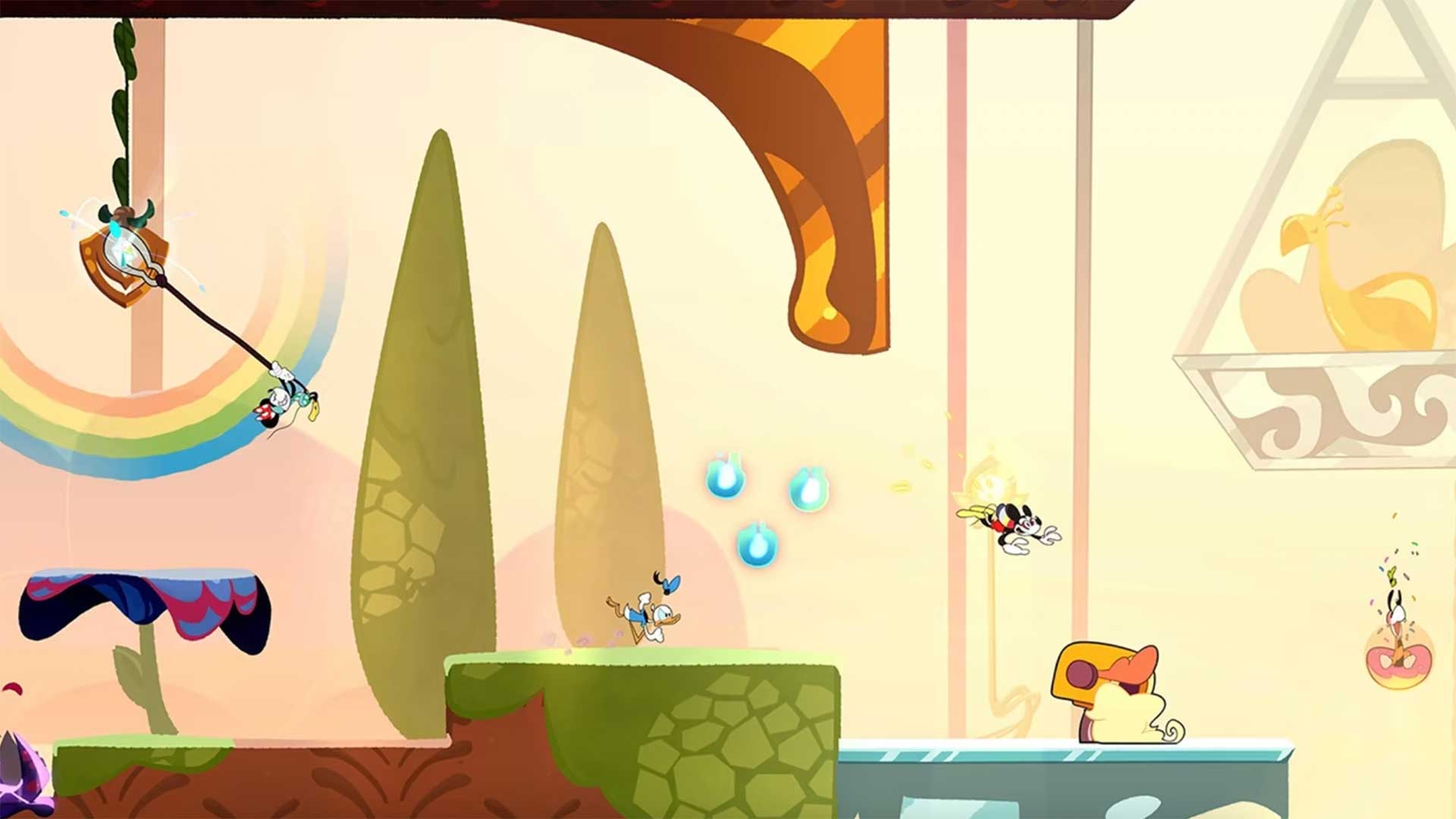In a sense, playing Disney Illusion Island has been a nice full-circle moment for me. Some of my earliest gaming memories are enjoying Disney’s Hercules and Walt Disney World Quest: Magical Racing Tour with my single mother, and now, I’ve spent the past couple of weeks playing Illusion Island with her.
That context is also important because Mum’s experience with games in the 20-odd years since has been pretty limited, outside of Sackboy: A Big Adventure and, to her credit, the comparatively more complex It Takes Two. And yet, Disney Illusion Island has been a pretty smooth experience for her.
Indeed, that’s the beauty of the latest game from Battletoads (2020) developer Dlala Studios. It takes the conventions of the “Metroidvania” genre — backtracking to old areas with new abilities or items to unlock previously inaccessible paths — and makes them approachable to all audiences. In this way, Illusion Island — which can be played alone but supports up to four-player co-op — makes for a pitch-perfect family game.
Immediately, Illusion Island grabs you with its delightful 2D art style, which emulates the look of classic Mickey Mouse cartoons. That, coupled with veteran Disney voice actors Bret Iwan (Mickey), Kaitlyn Robrock (Minnie), Tony Anselmo (Donald), and Bill Farmer (Goofy), gives the game a high level of authenticity.
Story-wise, Illusion Island follows Mickey, Minnie, Donald, and Goofy as they seek out three tomes to save the mysterious island of Monoth. It’s a pretty standard game plot, but I was surprised at how much fun Dlala has with it. There’s a fair amount of levity in the writing, particularly at the expense of the ever-cantankerous Donald, which should make for some good fun for kids.The real star of the game, though, is its world. Monoth itself is broken down into three distinct biomes: the flora- and fauna-filled Pavonia, futuristic-looking Gizmopolis, and stunning constellation-themed Astrono. The variety in locales is an effective way to sell the idea of Mickey and friends being on a grand adventure. Along the way, you’ll meet quirky characters like the alligator inventor Mazzy and robot scout Jido, which further flesh out Monoth.
What’s more, the actual level design of these areas — and through that, the ways you interact with them — is quite solid. This is particularly important in Illusion Island since there’s no actual combat; instead, you’re hopping over enemies and hazards and, in the case of the occasional boss fight, damaging them through platforming. Thankfully, the pace at which the platforming expands is quite steady.
Before too long, you’ll gain new abilities that expand your repertoire and open up the map, like a double jump, the ability to briefly cling to walls, and a rope to swing from hanging objects. While these are fairly routine platforming abilities, there’s a lovely bit of personality here, with each character having their own functionally identical but visually unique version of each move. For instance, Minnie uses a lasso to swing, while Goofy humourously has sausage links. Of course, keeping things relatively simple in terms of your ability set is also just a key part of ensuring that the game is suitable for all ages. In that way, Illusion Island feels like a perfect entry point to Metroidvania-style games. It’s that satisfaction of returning to old areas and successfully using newfound abilities to unlock previous barriers, especially after you’ve gone through a series of platforming sections to get there. That’s all here, and in a welcoming package that anyone can enjoy, no less.
Of course, keeping things relatively simple in terms of your ability set is also just a key part of ensuring that the game is suitable for all ages. In that way, Illusion Island feels like a perfect entry point to Metroidvania-style games. It’s that satisfaction of returning to old areas and successfully using newfound abilities to unlock previous barriers, especially after you’ve gone through a series of platforming sections to get there. That’s all here, and in a welcoming package that anyone can enjoy, no less.
And to that point, Illusion Island has one of the best approaches to approachability that I’ve seen in some time. As soon as you boot it up and select your character, you can choose how many hearts you have. Those who want a challenge can go below the standard three, while a metal heart is available for infinite health. Further, you can hug your teammates at any time to restore one heart to the whole team, which is a wholesome and clever way to encourage collaboration while also giving you a bit of help if needed. (This also further illustrates the game’s finer touches, like Donald hilariously rolling his eyes in a “let’s get this over with” sort of way before embracing.) The hug is just one co-op-specific move that lets you further interact with your teammates in some novel ways. Others include the ability to ‘leapfrog’ over one another to increase jump distance and drop a rope for your friends to climb. The latter ability is my absolute favourite. In other games, I’ve had to take the controller from Mum to beat a part she was having trouble with, but in Illusion Island, I can simply drop a rope to give her a hand in certain instances. It’s an ingenious way to let your ally retain full control over their character while still getting some help, and it’s easy to see how that will allow kids — not to mention frustrated parents — to feel more involved than a more experienced player taking over from them.
The hug is just one co-op-specific move that lets you further interact with your teammates in some novel ways. Others include the ability to ‘leapfrog’ over one another to increase jump distance and drop a rope for your friends to climb. The latter ability is my absolute favourite. In other games, I’ve had to take the controller from Mum to beat a part she was having trouble with, but in Illusion Island, I can simply drop a rope to give her a hand in certain instances. It’s an ingenious way to let your ally retain full control over their character while still getting some help, and it’s easy to see how that will allow kids — not to mention frustrated parents — to feel more involved than a more experienced player taking over from them.
My only real gripes with Illusion Island stem from some of the exploration itself. On a base level, I do wish that the rewards you unlock felt more meaningful; they largely consist of little pieces of collectible artwork. It had me wanting a greater variety of loot, such as alternate looks for our heroes, and I felt less compelled to seek them out as a result. Meanwhile, Illusion Island does, quite often, rely on a repetitive “find three keys to unlock a door” structure, which slightly diminishes the game’s moment-to-moment charms.
Those issues aside, Illusion Island is a wonderful addition to the Metroidvania genre. Taking something as universally loved as Mickey Mouse and creating an inviting platforming experience around that was brilliant, and the fact that you can play it with friends and family only sweetens the deal. This is a must-play for Switch owners looking for their next family game.
Disney Illusion Island will release exclusively on the Nintendo Switch on July 28th.
Image credit: Disney Games
